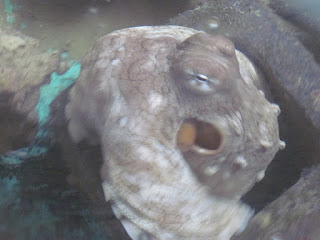Today we drove to the windward side of the island to the ahupua'a of He'eia. We actually got to ride on a boat, a landing craft to be specific, to get to Moku o Lo'e (also known as Coconut Island), which is the home base of the UH's Hawai'i Institute of Marine Biology. It took about 30 minutes to get to the island, which is actually not far away.
Our ride took a bit longer because we slowed down to do a "plankton tow." Mike of HIMB showed us how to do it and explained how important plankton is to all of us -- we didn't realize that it creates 50% of the Earth's oxygen.
There's the island! It's only 27.5 acres big.
Once on land, we went on a walking tour led by our guides, Mike and Sylvia. One of the first stops was to see the Super Sucker. This modified boat is used to suck up invasive algae that is taking over the bay. It's a great innovation!
We also stopped by the shark pen area and saw a black-tip reef shark swimming peacefully. We learned that it isn't really dangerous to people.
Here's a large pufferfish that was swimming in the same area.
In this tank, we saw a really large octopus that is being studied by a researcher.
In another tank we saw two baby hammerhead sharks. A researcher is studying whether or not hammerheads can navigate by magnetic fields.
Scientists are also doing aquaculture research to grow fish like yellow-fin tuna, which are becoming more rare in the wild.
During lunch, Stephanie, who is a marine mammal researcher, talked to us about her work. She fascinated us with her studies on dolphins and false kililer whales. She's studying the impact of human-made noises on these mammals. Scientists use brain waves to determine their hearing abilities.
It was soon time to leave this little island that is home to a lot of marine research. We only saw a bit of it but hopefully we can come back to see more.
We're glad that Aunty Tia from NOAA got to come with us on this trip.
Mahalo the people of the Hawai'i Institute of Marine Biology for allowing us to visit and learn about marine biology research. It was eye-opening and fun!


















No comments:
Post a Comment